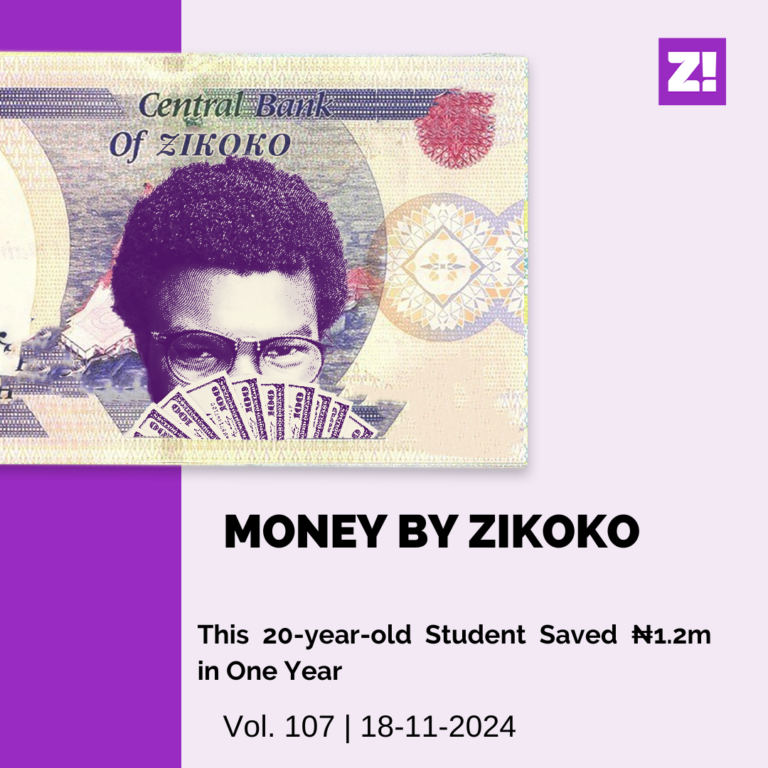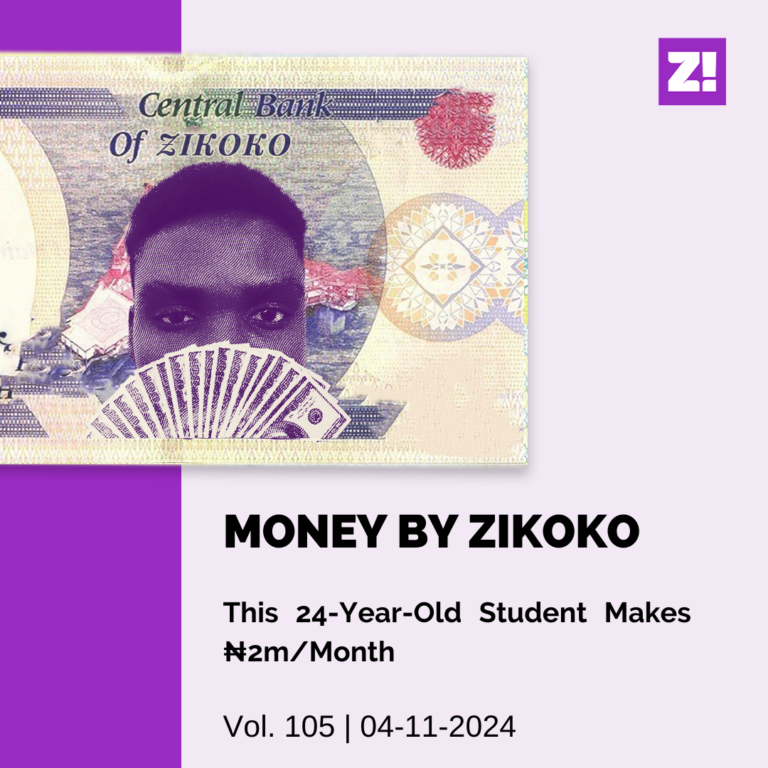Every week, Zikoko seeks to understand how people move the Naira in and out of their lives. Some stories will be struggle-ish, others will be bougie. All the time, it’ll be revealing.
Inside this #NairaLife is a 30-year-old actress and screenwriter whose biggest struggle is income stability. Does her line of work have something to do with this? Yes, but it runs a little deeper than that.
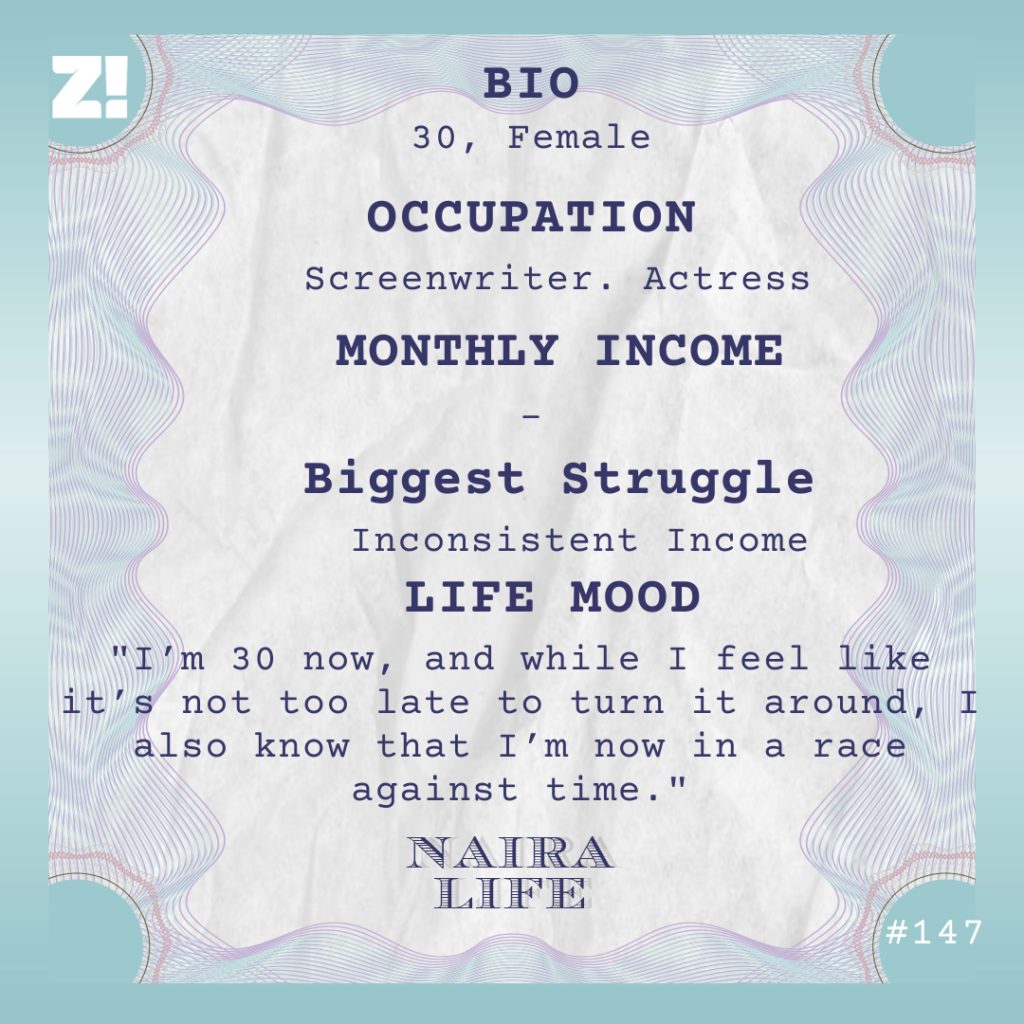
Let’s start with your earliest memory of money.
It was watching my mum carry most of the financial weight of the family. My dad is a full-time pastor and my mum is a civil servant. Although her civil service salary wasn’t much, it was better than what my dad earned at the church. I was 10 years old when I became aware of this. But that wasn’t the most important realisation.
What was it?
I found out we were living on faith. For every major project my parents wanted to do and couldn’t afford, they prayed for the money. Somehow, the money always showed up. It could be a loan from my mum’s place of work or a gift to my dad. This wasn’t very healthy. My parents — my dad especially — started making decisions because he hoped that we would find the money, not necessarily because we could afford it.
Tell me about a time this happened.
When I finished secondary school in 2007, my dad insisted that I go to a private university and study economics. We could barely afford a public university o. We settled on a university in the south-south, and when we found out how much it would cost, it became a prayer point. The tuition was about ₦230k.
The family started gathering the money little by little. A week before resumption, we needed ₦50k to complete the fees, and it didn’t seem like we would find the balance. Then on the night before I was supposed to leave, someone my dad knew showed up at our house with an envelope. There was ₦50k in it.
The exact amount you needed?
The exact amount. There were other cases like that when things came through at the last minute. In the long run, this made me complacent with my finances. The financial education I got from my parents was pretty much “pray for the money and it would come”.
How did uni go?
I switched to another private university in the southwest in my second year because my grandmother wanted me to be closer to her. My mother covered my tuition until I graduated, and she took a lot of loans for it. I didn’t have a steady allowance because tuition took most of our budget. On average, I was getting between ₦3k and ₦5k at a time, but I didn’t know when it would come.
I didn’t have a lot of needs. It didn’t matter that a lot of the people in my school drove cars and everyone I knew had a BlackBerry phone. As long as I had food, I was fine. I also had a thing for spending money on my friends when my parents sent money even though it meant I’d go back to being broke within a week. For someone who liked to give money away, I didn’t care about getting extra income. Until the time I graduated in 2011, I had never done anything for money.
When did this change?
2012. I served in a state in the north central. Nothing much happened in my Place of Primary Assignment (PPA), which gave me time to get a front desk officer job at a hotel. The pay was ₦15k/month. Add this to the ₦19,800 I got from the federal government and my total monthly earning was ₦34,800. Most of the monthly running costs went into transportation and chipping in at home. The way my family worked, whatever one person earned is everyone’s money. I spent six months at the job.
Why did you leave?
I got bored. In the same month I quit, I got another job as a receptionist at a real estate company. ₦30k/month. However, I had to work at least 12 hours every day in unfavourable conditions. I had a bar stool for a chair, and I’d sit there from 8 a.m to 8 p.m, trying my best to smile at customers because that was what I was expected to do.
A month after I started the job, one of my aunts noticed how much weight I had lost and asked me to quit, promising to send me ₦30k every month until I finished my service year. I thought it was a good deal and quit.
Did she come through?
Haha. She did for a month, and that was it. I decided to live on my monthly stipend from the government until I finished NYSC. My service year ended in 2013.
Post-NYSC?
I had always wanted to do something creative for work, never mind that it’s a pivot from what I studied in university. I found a school in Lagos that offered a 3-month certificate course on screenwriting. The tuition was ₦165k. My mum gathered the money for me, and I moved to Lagos in February 2013.
Something else happened in the same month.
What was that?
My mum won a scholarship sponsored by the Australian government, and they said she could bring her husband and her children under 18 with her. Everyone in the family, except me, was eligible to travel with her, so I remained in Nigeria. I didn’t mind this because I had my screenwriting course.
How did it go?
Very well. As soon as I completed the programme, I got an offer to write scripts for a cable network. They paid $1k per script.
Baller. How did this work?
I pitched my ideas to them and wrote the ones they liked. I got paid a month or two after the script was approved. Between 2014 and 2015, I wrote four scripts. The exchange rate of dollar to naira at the time was $1 to ₦200, so I earned ₦800k from the job. The bulk of the payments went into settling debt.
Oh?
I couldn’t turn to my family for help much because they were out of the country. And because they were living on the stipend my mum got from her scholarship, I thought they needed money more than I did. The next best thing was to turn to friends and ask for loans, so I was borrowing money from friends. I have to point out that I didn’t think I was living from hand to mouth. For some reason, I was in a bubble where I thought I only needed to have faith, persevere a little and everything good would come. That bubble burst in 2014.
What happened?
My younger brother won a football scholarship to study in the US. However, the scholarship only covered 60% of his tuition. As usual, the family believed that God would do it. I think my parents raised some of the balance and sent him on his way, hoping to find the rest. My brother started to struggle in the US and nobody could come through for him. My mum had only her stipend, my dad had no income, and I was in Nigeria living from hand to mouth. In the end, my brother failed to meet the multiple payment deadlines and extensions, and he lost the admission offer. It broke all of us.
Damn. That must hurt so bad.
See, my mindset shifted immediately, and I started to realise that I may need to start looking for ways to get money and not trusting that it would just show up.
What came after this realisation?
I became interested in money and how to make it. Later in 2014, I got another job in the writing room of an indie TV show, and I got paid ₦20k per episode. From 2014 to 2016, I wrote 23 episodes of the show.
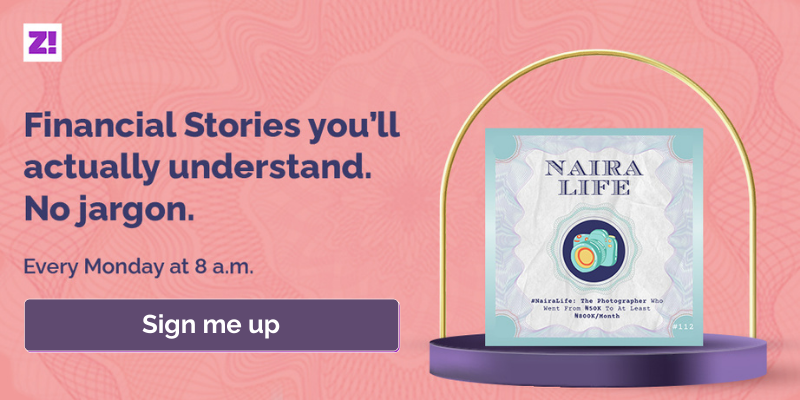
Were you still borrowing money from your friends?
Oh, I was. Small loans from multiple sources helped me survive the period. I would borrow money, return it when I get paid, and borrow from someone else. It was a never-ending cycle.
I spread my wings a little after 2014. I got my first acting job in 2015. It was a small role in a TV show, and I was paid ₦25k for it. I was written back into the show during the second season, and that brought in ₦40k. While I was shooting this show, a TV network reached out.
What did they want?
They wanted me to voice a character for a show they were translating into Yoruba. I got hired, and that gig paid me ₦250k.
That must have felt like a big break.
It would have felt like that if I got a couple more roles that paid that much. Now, I was a little more interested in money, and I decided to act on it.
What did you do?
I started a drama company of sorts and worked on my first stage play. I had always been active in the drama unit of my church, so people volunteered as cast and crew members. Someone even sponsored and dropped ₦250k. I got an additional ₦100k from individual contributors. In December 2015, we showed my first stage play.
Yay. How did it go?
A ticket to the show cost ₦1k and we had 250 people in the audience. But we made about ₦220k in ticket sales because not everyone bought a ticket. Regardless, everyone thought it was a success.
My mum came home from Australia to support me, and she pushed for me to take the show to Abuja. I put the money we made from the Lagos show and some extra money I got from my mum and showed the play to an Abuja audience in January 2016. Bruv, everything went down the drain.
What happened?
To be honest, we did the Lagos show based on vibes and spent nothing on marketing. I thought we could ride on the same wave in Abuja. Only 50 people came to see the show, and just about 15 people bought tickets. Most of them were even family and friends.
That’s rough.
That taught me I wasn’t special, but I continued working on more shows. Nothing much happened until August 2017 when I got another job.
Where was this?
A children’s clothing store, and I was hired as an e-commerce officer. The pay was ₦45k/month. After three months, a new chief operations officer came in and moved me to the brand and marketing department. I quit four months later because there was hardly any space for expression and the owner thought they owned us because they paid us a salary. When I couldn’t deal with it anymore, I turned in my resignation letter. This was February 2018.
What came after?
My focus returned to writing and producing stage plays — all of them faith-based stories. By 2019, I had written six plays and done 15 productions in Lagos and Abuja. None of them was as successful as the first one I showed in 2015. Whatever little money I made from a show went into paying a vendor I was owing or planning the next one. I wasn’t even paying my cast or crew — they were there because they volunteered. But I had to care of all the logistics. I borrowed money to make it work. By December 2019, there was a problem — I was neck-deep in debt.
Omo. How much?
About ₦500k. My team understood when I told them I could no longer run the organisation, and most of them raised money for me to settle the debt — ₦500 here, ₦1000k there. With what they raised for me and some additional money my mum got, I cleared half of the debt.
With that settled, I knew I had to go back to full-time employment. It didn’t make sense to continue producing plays no one was coming to watch. I started looking for a job.
When did you find one?
February 2020. A bank had just started a creative unit to create ads, and they needed a screenwriter. Someone referred me, and I got the job. My salary was ₦230k.
Nice.
This was the first time in a long time I got paid every month. My priority was clearing my debt, and I did that within the first few months. Then I figured it was time to start saving, but that just didn’t work.
Why not?
I returned to being an impulsive giver. 2020 was tough for a lot of people I know. I couldn’t see my people constantly in need without stepping in. Whenever people hit me up, I sent whatever I had, even if it was money I had intended to save. My partner at the time also had a major financial challenge, so my money was going out almost as quickly as it was coming in.
Things move fast when you have a little money to spend. Soon, it was January 2021, and it came with a feeling.
What was it?
I was going to lose my job. Since after the lockdown, they had been asking people what they were bringing to the table. They also let some people go in 2020, but I wasn’t touched because my department head was fighting to keep us. I knew she couldn’t do it for much longer, and I was right. From January to April, it was one issue or the other with HR. None of it was hardly my fault. The whole back and forth started to stress me. I figured it was time to leave in April.
Now that I think about it, I probably decided to leave because I had started another production company. I shot my short film in January, and it was released in April. I spent ₦450k on this — my mum dropped half of the money. Then I started to work on a series, which cost me ₦200k to produce.
Back to the job. I told them in April that I was going to leave. This happened in May. Like that, I didn’t have a monthly income anymore. Thankfully, I got an acting job, which paid me ₦220k in June. In the same month, I was hired to write a screenplay for a show, and I got ₦150k for that. One month later, I got another writing job that paid me ₦650k.
Man, you were on a streak.
Haha. The payment was made in four instalments between July and September, so the money didn’t have as much impact as I imagine it would have if I had been paid everything at once. I worked on my second short film and released it in September. The production cost was about ₦120k.
I’ve been on a dry run since that time — I haven’t gotten another gig or worked on a project. I woke up one day in October and came to terms that I was back to being broke.
What steps did you take after this?
My parents had returned to the country in 2016, so I moved back in with them. That was the best decision I could make for myself at this point.
Fair enough.
I’m still figuring out what next to do, but I need to continue earning in the meantime. In October, I registered on Bigo, a live streaming platform where I have been hosting a show. I made ₦50k from that at the end of the month. The show continues this month, and I’m hoping to surpass that number.
What’s a good number for you right now?
Oh my goodness, anything from ₦700k sounds great. I have a friend who makes about ₦800k/month from the same platform. Realistically, it will take a while before I hit that number on Bigo.
I also believe that I should be earning as much from paid employment. I know what I can do, but I haven’t explored the possibilities of a full-time job that much. Although paid employment will give me the income stability I don’t have at the moment, I don’t think it’s for me. I can’t deal with the whole routine that comes with it.
I see. How do you navigate life without a steady income?
It’s the same way I’ve navigated everything else: contentedness. I make do with what I earn when I earn it. As long as it covers my feeding and other basic needs, I’m fine. Some people might argue that I’m not ambitious. While I don’t think that’s true, I’ve always struggled with making long terms plans. I have to find a way to fix this now that I’m back to filmmaking.
What do your finances currently look like?
The only savings I have to my name is ₦28k locked in a Cowrywise plan. At the moment, most of my expenses go into data and food. I would say I spend about ₦50k every month, and a lot of it comes from money gifts from my mum and friends.
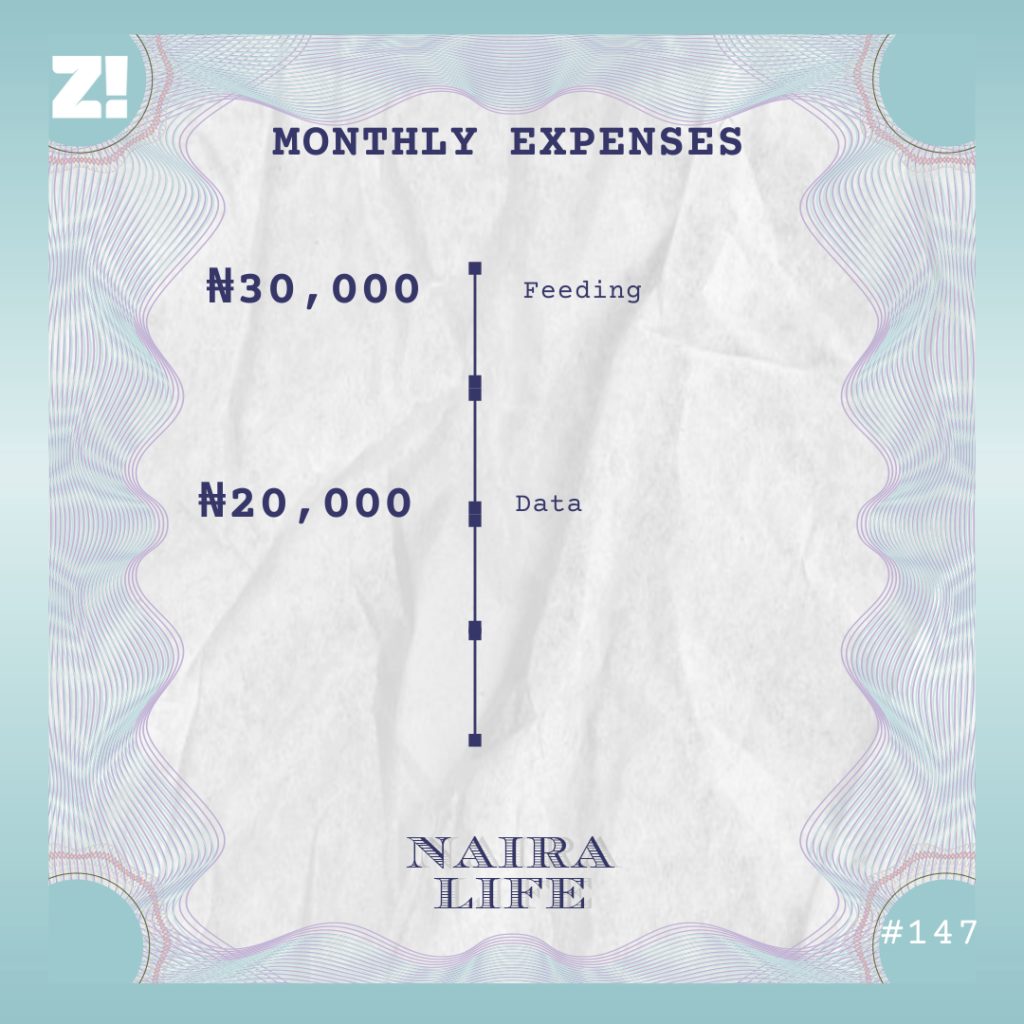
How have your experiences over the past years shaped your perspective about money?
Having faith is great, but it won’t automatically put you on a path to financial independence. Financial education will. I feel like if I had been interested in how to make money earlier, I would have done better. I wish my parents had actual conversations about money when I was younger and didn’t always go down the “let’s pray and the money will come” route.
My dad woke up one day in 2017 and realised that he didn’t have anything he could leave behind for his kids. The realisation and regret hit him deeply, and he struggled a lot with it. He talked about starting a couple of things but didn’t have the strength and knowledge to make it happen. More importantly, he had lost time. I’m 30 now, and while I feel like it’s not too late to turn it around, I also know I’m now in a race against time.
What parts of your finances do you think you could have been better at?
Impulsive giving. That was something I did consistently over the years even when I couldn’t afford it. I don’t think I’m very good at saving money either, but I didn’t give myself a chance to find out.
I have a feeling that there’s something you want right now but can’t afford?
There is. Film equipment — camera, light and sound. All of this should run into about ₦3.5m. I can do more with them, but I don’t have that much money laying around at the moment.
What about something you purchased recently that improved the quality of your life?
I bought a used iPhone XR in August for content creation, and it cost ₦185k. It’s the best investment I’ve made this year. The quality of my videos has greatly improved just because of that phone.
Lit. How would you rate your financial happiness on a scale of 1-10?
I’m at a 3 right now. I’m still super broke and nowhere close to where I could be. That said, I’m very grateful for the opportunities to tell stories, and I have told a couple. This — for me— means I’ve not lived very badly, and I’ll just focus on that.

